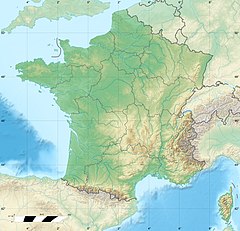
Deep brain stimulation (DBS) is a neurosurgical procedure involving the placement of a medical device called a neurostimulator, which sends electrical impulses, through implanted electrodes, to specific targets in the brain for the treatment of movement disorders, including Parkinson's disease, essential tremor, dystonia, and other conditions such as obsessive-compulsive disorder (OCD) and epilepsy. While its underlying principles and mechanisms are not fully understood, DBS directly changes brain activity in a controlled manner.
Lasker-DeBakey Clinical Medical Research Award is one of four annual awards presented by the Lasker Foundation. The Lasker-DeBakey award is given to honor outstanding work for the understanding, diagnosis, prevention, treatment, and cure of disease. This award was renamed in 2008 in honor of Michael E. DeBakey. It was previously known as the Albert Lasker Award for Clinical Medical Research.

Minatec is a research complex specializing in micro-nano technologies in Grenoble, France.
Joseph Fourier University was a French university situated in the city of Grenoble and focused on the fields of sciences, technologies and health. It is now part of the Université Grenoble Alpes.

The Université Grenoble Alpes is a public research university in Grenoble, France. Founded in 1339, it is the third largest university in France with about 60,000 students and over 3,000 researchers.

The history of Parkinson's disease expands from 1817, when British apothecary James Parkinson published An Essay on the Shaking Palsy, to modern times. Before Parkinson's descriptions, others had already described features of the disease that would bear his name, while the 20th century greatly improved knowledge of the disease and its treatments. PD was then known as paralysis agitans. The term "Parkinson's disease" was coined in 1865 by William Sanders and later popularized by French neurologist Jean-Martin Charcot. Paralysis
David Charles is an American neurologist, professor and vice-chair of neurology, and the medical director of Telehealth at Vanderbilt University Medical Center.

Christine Petit is a French geneticist. She holds professorships at the Collège de France and the Pasteur Institute.

The Grenoble Alpes University Hospital is a French teaching hospital built in 1974. With a total capacity of over 2 133 beds in 2020, it is the main hospital of Grenoble and Isère in France. The CHU Grenoble receives all phone calls from the department of Isère dialled through the emergency number 15 via the Reception Center and Call Control.

Alim Louis Benabid is a French-Algerian emeritus professor, neurosurgeon and member of the French Academy of Sciences, who has had a global impact in the development of deep brain stimulation (DBS) for Parkinson's disease and other movement disorders. He became emeritus professor of biophysics at the Joseph Fourier University in Grenoble in September 2007, and chairman of the board of the Edmond J. Safra Biomedical Research Center in 2009 at Clinatec, a multidisciplinary institute he co-founded in Grenoble that applies nanotechnologies to neurosciences.
Mahlon R. DeLong is an American neurologist and professor at the Medical School of Emory University. His research has advanced the understanding and treatment of Parkinson's disease, dystonia, tremor and other neurological movement disorders.

Yves Agid is a neurologist, neuropsychiatrist, cell biologist, neurochemist, academician, university professor, hospital doctor, researcher in biology and scientist specializing in neurosciences.

Côte d'Azur University is a public research university located in Nice, France and neighboring areas. In 2019, it replaced the University of Nice Sophia Antipolis and the community (ComUE) that was created in 2013. On 9 January 2020, Jeanick Brisswalter was elected as president of Côte d'Azur University.

The Polygone Scientifique is a neighborhood of the city of Grenoble in France. It includes a significant number of research centers in a presque-isle between Isère and Drac.
Jacques Glowinski was a French pharmacist and biology researcher specializing in neurobiology and neuropharmacology for which he is considered one of the founding fathers in France. He was a professor at the Collège de France and was also its administrator. He was a member of the French Academy of sciences.
Ali Rezai is a neurosurgeon interested in advancing the use of brain chip implants in deep brain stimulation and neuromodulation to treat Parkinson's disease, obsessive–compulsive disorder, Alzheimer's disease and traumatic brain injury.
The prix Jaffé is a prize of the Institut de France awarded by nomination of the French Academy of Sciences. The award is financially supported by the Jaffé foundation of the Institute.
Élisabeth Tournier-Lasserve is a French neurologist, medical geneticist, university professor and hospital practitioner in genetics. Together with three colleagues, she was the co-recipient of the Brain Prize in 2019, the world's largest brain research prize.
Vladimir Petrovich Mineev is a Russian theoretical physicist, specializing in condensed matter physics.
Sonia Garel is a French immunologist who is a professor of neurobiology at the Collège de France. She was appointed to the Ordre national du Mérite in 2016 and won the 2020 Prize of the NRJ- Institut de France Foundation.












